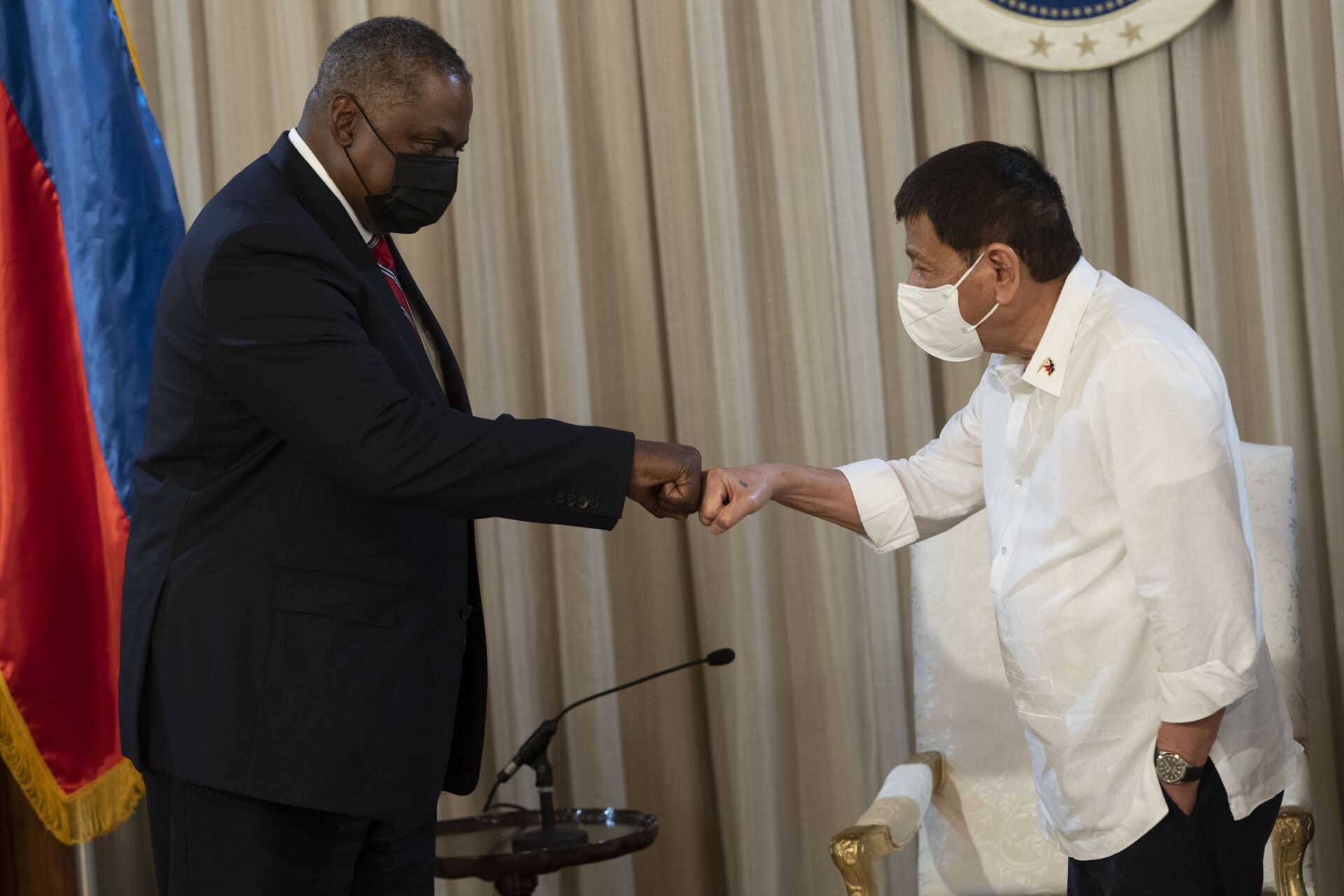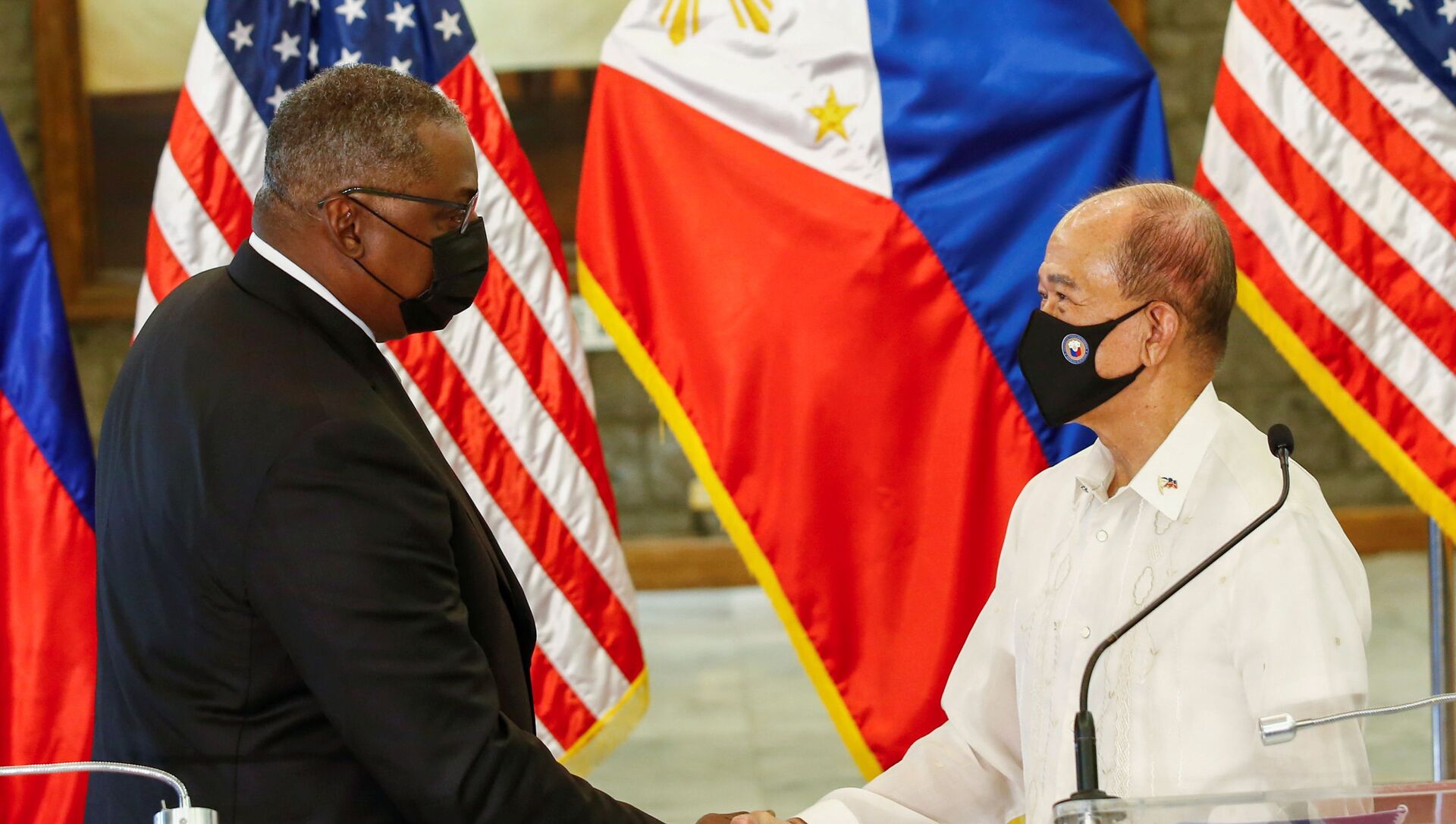‘As If Nothing Happened’: In Shocking 180, Duterte Fully Restores US Visiting Forces Agreement
Subscribe
Earlier this month, US Secretary of State Antony Blinken reaffirmed Washington’s support for Manila’s territorial claims in the South China Sea, saying in a thinly-veiled message to Beijing that an “armed attack” on Philippine military or civilian vessels “would invoke US mutual defense commitments.”
After months of vacillation on the future of the Visiting Forces Agreement (VFA), Phillipine President Rodrigo Duterte has renewed the agreement that allows US troops to remain in the country.
The decision came amid a visit by US Secretary of Defense Lloyd Austin, who is touring several Southeast Asian nations in an attempt to shore up US defense ties in the region. However, Philippine Defense Secretary Delfin Lorenzana let slip last week that the agreement was no longer in danger.
“There was a termination letter that was submitted by the government to the US; that letter has been retracted, as if nothing happened,” Lorenzana told the media Friday at the Philippine armed forces’ headquarters in Quezon City.
"The VFA is in full force again, there is no termination letter that is pending," he added. "We are back on track, Mr. Secretary, to plan for future exercises under the VFA."
“I don’t know the reason behind the President’s decision, I am not privy to the decision making. The DFA has been working for this to happen,” Lorenzana later said. “Maybe the President was just convinced so he decided to continue with the VFA.” However, he noted that Austin’s arrival had led to an “open and frank discussion on the status and future direction of Philippines-US engagement.”
“They agreed that the alliance can be further strengthened through enhanced communication and greater cooperation, particularly in the areas of pandemic response, combating transnational crimes, including the war on illegal drugs, maritime domain awareness, the rule of law, and trade and investments,” he added.
Harry Roque, Duterte's spokesperson, later clarified the president had made his decision "based on upholding the Philippines' strategic core interest … and clarity of US position on its obligations and commitments under the MDT (Mutual Defense Treaty)” signed in 1951.

Secretary of Defense Lloyd J. Austin III meets with Philippine President Rodrigo Duterte in Manila, July 29, 2021.
Duterte originally said in February 2020 that the VFA would be cancelled in six months, but has repeatedly “frozen” that decision and pushed that deadline back. The agreement historically provided the legal pretext for two large military bases on the island of Luzon - Clark Air Base and Subic Bay Naval Base - but the 1991 eruption of Mount Pinatubo severely damaged both bases, forcing them to close, and the Pentagon dramatically reduced its presence in the country.
Lorenzana noted last week that the VFA would have “some addendum, side agreement” added to sweeten the deal, adding on Friday that the controversial part of the VFA in which the US retains custody over soldiers during their trials for heinous crimes in the Philippines would be settled in “an adjunct or an additional agreement between the two countries.”
The issue has come up twice since the VFA entered force in 1999. In 2005, four US Marines were accused of gang-raping a Filipina woman named Suzette Nicolas. Just one was convicted, Lance Corporal Daniel Smith, but his detention in the US embassy in Manila during the trial and after his sentencing provoked fury across the country.
The other case was in 2015, when Lance Cpl. Joseph Scott Pemberton, a US Marine was convicted of murdering a Filipino trans woman named Jennifer Laude while his ship was docked at Subic Bay. Given a lighter sentence than had been sought and than many in the public believed he deserved, the incident prompted calls from trans rights defenders of “special treatment” for US soldiers in the country. In September 2020, Duterte gave Pemberton an absolute pardon, freeing from prison and deporting him from the country.
Solidifying the VFA means that, for now, the Philippines remains firmly in the US camp, even as Duterte plays China and the US off each other for his own gain. Manila hopes that the US will back its position in the South China Sea, but it’s also continuing to negotiate a code of conduct for the waterway between other Association of Southeast Asian Nations (ASEAN) members and China. The document would create a structure based on the United Nations Law of the Sea (UNCLOS) for settling the many disputes involving overlapping claims of maritime rights and territorial claims in the South China Sea.
The US has given the talks a cold shoulder, claiming they are being dominated by China. “We don’t believe that any one country should be able to dictate the rules or worse yet, throw them over the transom, and in this regard I’ll emphasize our commitment to freedom of the seas,” Austin said Monday in Singapore.
The Philippines were a colony of the United States for more than 50 years, following the territory’s seizure from Spain in the Spanish-American War and the bloody suppression of a nationalist insurrection by the US afterward. The Japanese Empire invaded the archipelago in 1941 and turned it into their own colony, but US forces forced the Japanese out before the war was over. In 1947, the Philippines was granted independence.


